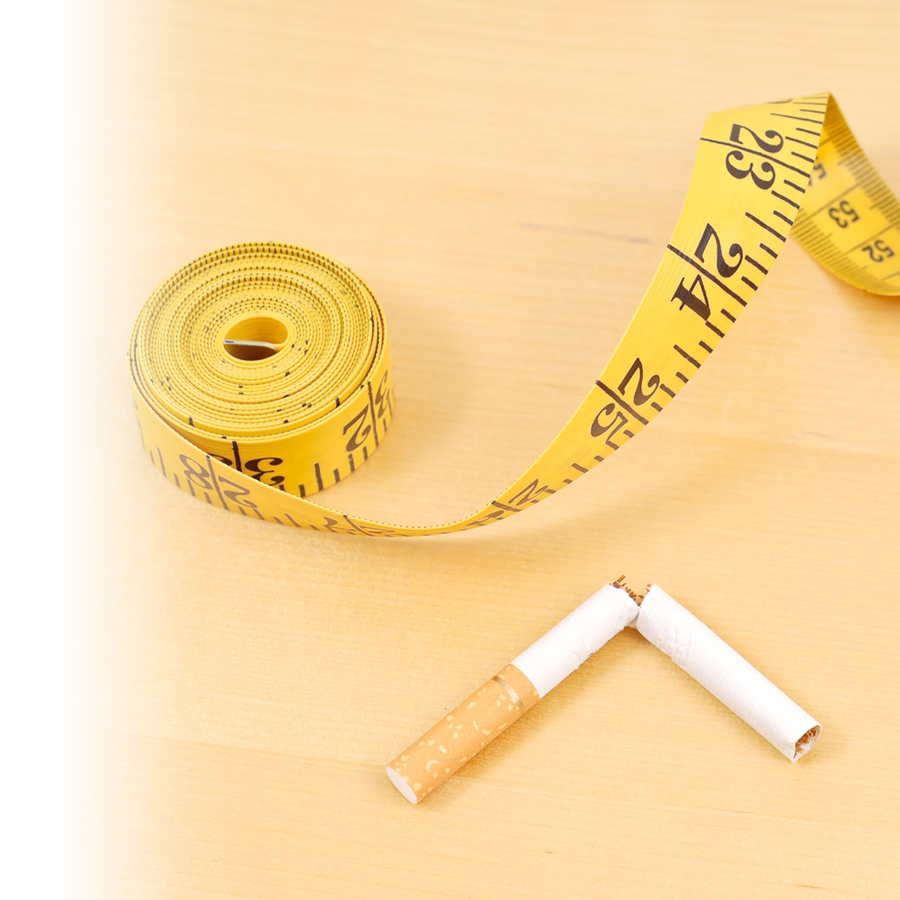The fear of gaining weight is often an obstacle to quitting smoking. Yet, the benefits of smoking cessation far outweight putting on a few pounds.
Putting things into perspective
The fear of gaining weight is a reason frequently cited by people, barring them from quitting smoking. It is true that smoking cessation can contribute to some weight gain, and it isn’t pleasant to see one’s physical appearance change.
Let us put things into perspective. If you are concerned about this issue, tell yourself that smoking affects your physical appearance in several ways, since it:
- dulls your complexion
- ages your skin prematurely
- makes your teeth, hair and fingers yellow, and
- gives bad breath and alters the way you smell
You can bet on the fact that, despite a few extra pounds, your charm ranking will greatly improve in the eyes of those around you if you quit smoking.
Trust yourself: you will find ways to limit weight gain and you will eventually shed the extra pounds. You may even be surprised to learn that you are among those who successfully quit smoking without gaining weight!
The truth about weight gain
Why is it that smokers seem less likely to gain weight? Here are three explanations. Smoking:
- dulls taste and smell, which in turn reduces your enthusiasm and enjoyment for food
- reduces hunger
- increases metabolism; that is, the body burns more energy (or calories)
Smoking cessation leads to an average weight gain of 2.3 to 4.7 kg (5 to 10 pounds) after a year of abstinence. Because this is an average, some people will hardly gain any weight at all, while others will gain a bit more.
Most of the weight gain will occur in the first two months and will then slow down considerably after six months. Don’t worry, regardless of the weight you may put on, the benefits of smoke cessation on your health will always greatly surpass the drawbacks, even if you are overweight.
Caution: smoking cessation is often accompanied by strong urge to snack and difficulty recognizing when you are full. People who gain more than 10 kg after quitting smoking may have replaced their cigarette addiction with food, since it isn’t normal, or expected, to gain that much weight.
After a year, metabolism finds its balance again and weight becomes stabilized once more. Many people lose weight after this time without any particular effort. After a year, if you have gained weight following smoking cessation, it will be time for you to concentrate your energy on losing the kilos that you have gained.
Advice on how to limit weight gain
- Eat healthy by following the Canada Food guide recommendations.
- Do not follow a diet during the smoking cessation process, but watch what you eat. Because smoking cessation is a complex process that requires energy, time and motivation, concentrate all of your effort on that. You can always focus on losing the weight later on if you feel the need to.
- Make strategic food choices at the grocery store. Avoid foods and drinks that are high in calories and low in nutrients, such as chocolate, chips, sweets, soft drinks, etc. Fill your cart with healthy and nutritional foods that are low in fat, sugar and calories, such as fruits and vegetables, nuts, seeds, whole grain cereal, etc.
- Fill your refrigerator with satisfying foods in case you get cravings: raspberries, strawberries, blueberries, grapes, carrots, celery, sunflower seeds, etc. Choosing small-sized foods that can be eaten in several bites has the advantage of keeping your hands busy and giving you the opportunity to get through your craving without consuming too many calories.
- Limit your alcohol consumption, as alcohol contains a lot of calories and often goes hand in hand with smoking and can make your cravings to smoke worse.
- Keep a journal of what you eat. This will allow you to visualize your excesses and to become aware of your eating habits.
- Exercise every day, ideally a minimum of 30 minutes of aerobic exercise such as walking, cycling or swimming. This will help you control your weight, reduce your urges to smoke, without counting the benefits for your health and well-being.
Your pharmacist can help you in the smoking cessation process in many ways, so don’t hesitate to talk to him/her.


